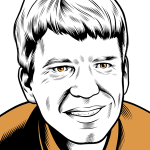The enigmatic and prodigious brainiac novelist Richard Powers tries to avoid flying, so when it comes time to visit his mother in Arizona, as he does at least once a year, he sometimes drives, normally overnight, from his home in central Illinois. Making his annual trek seven years ago, Powers was driving through central Nebraska near sunset when he became captivated not by another Gas ’n Go roadside attraction, but by a carpet of sandhill cranes, three feet tall, spreading in all directions over a barren field alongside Interstate 80. “I thought I was hallucinating from highway hypnosis,” he says now, “and I almost drove off the road.”
The Echo Maker, which just won this year’s National Book Award, tells the story of Mark Schluter, a twenty-seven-year-old meatpacker whose truck careers off an “arrow-straight” Nebraskan country road into a ditch on the banks of the Platte River. Mark recovers slowly from a fourteen-day coma only to learn later that he suffers from Capgras syndrome, a rare neurological disorder that leads him to believe that the woman who visits him every day in his hospital room claiming to be his sister Karin is, in fact, an impostor. The only person Mark seems to believe, for a while at least, is the famous neurologist and best-selling author Gerald Weber, whom Karin convinces to fly to the flatland to examine her brother. As Mark (kind of) gets better, Weber begins to disintegrate. It’s highly intricate and complex, but Powers juggles his manifold narrative threads with ease—as much a philosophical meditation on the mysteries of the brain as an emotional plea about the environment. Best of all, The Echo Maker’s a page-turner that finds its forty-nine-year-old creator as comfortable in the trenches of neuroscience as he’s previously been writing about molecular biology (in The Gold Bug Variations), artificial intelligence (in Galatea 2.2), and virtual reality (in Plowing the Dark).
I first met Richard Powers in the summer of 1998 at a bookstore in Oak Park, Illinois, which happens to be the hometown of Ernest Hemingway and not far from where Powers was born. At the time, he was on the first book tour of his career, in support of his novel Gain. Though never a recluse in the Pynchon vein, Powers hadn’t done much press and rarely granted interviews for his first five novels. In fact, after the publication of his first novel, Three Farmers on Their Way to a Dance, he moved to the Netherlands to write his next two books; his fourth book was written while in residence at the University of Cambridge. I don’t know what I expected,...
You have reached your article limit
Sign up for a digital subscription and continue reading all new issues, plus our entire archives, for just $1.50/month.
Already a subscriber? Sign in





